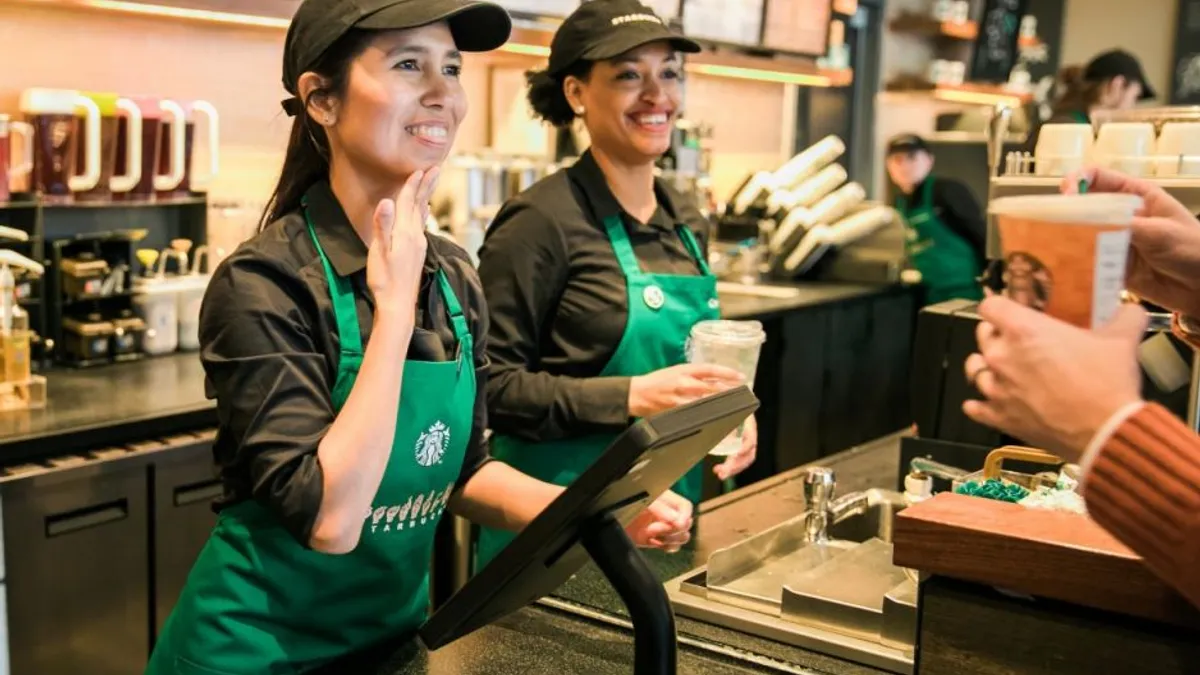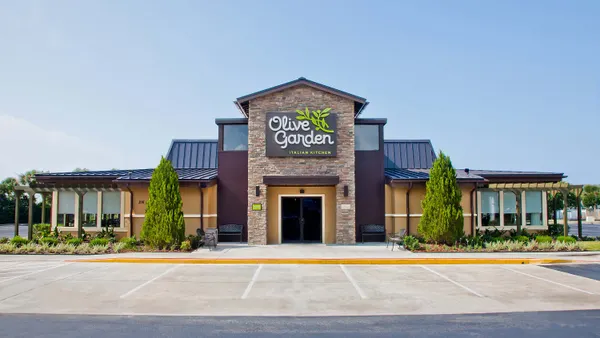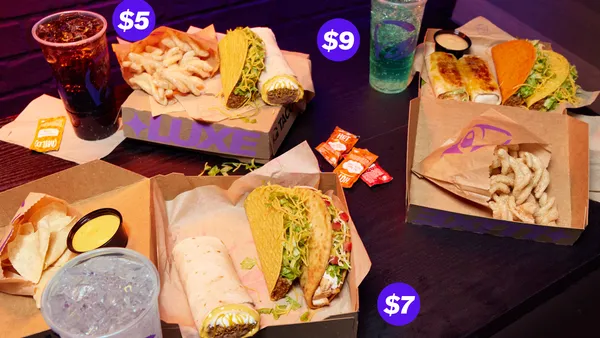Dive Brief:
- Starbucks opened its first U.S. "Signing Store" on Tuesday near Gallaudet University in Washington, a school dedicated to educating the deaf and hard-of-hearing. Modeled after a similar store in Kuala Lumpur, Malaysia, the D.C. cafe hired 25 deaf and hard-of-hearing employees, who are all proficient in American Sign Language, according to a company press release.
- Deaf employees wear aprons embroidered with the Starbucks name spelled out in sign (made by a deaf-owned business), while hearing colleagues sport "I Sign" pins. The space features anti-glare surfaces and more open space to make signing easier, two-way keyboards that let baristas and customers type and confirm orders, and digital displays that show when drinks are ready. A deaf professor from Gallaudet also painted a mural visible through the store windows, and a chalkboard highlights a "sign of the week" for non-signing customers to learn a few words in ASL.
- The release noted that Starbucks employs more than 200 deaf workers at stores across the country, but they typically work alongside hearing employees.
Dive Insight:
Starbucks' new Signing Store comes at a time when the restaurant industry is trying to make strides in promoting diversity and inclusion. Papa John's, which continues to struggle from the scandal with its founder John Schnatter, developed a campaign in August to highlight its new mandated diversity training and the steps it's taking to be more inclusive, QSR Magazine reported. In the fine dining arena, The James Beard Foundation made its own announcement earlier this month that discussed changes to how it would evaluate the winners of the organization's coveted award to promote diverse talent.
QSRs are often written off as viable workplaces for deaf job seekers because of their fast-paced nature, but that hasn't stopped deaf-owned restaurants from opening and succeeding, with the right strategy. For its Washington location, the coffee giant chose the Washington location for its proximity to Gallaudet University and the city's ties to deaf activism. H Street businesses have evolved to cater to the deaf community, where bartenders have taken up basic sign language.
In San Francisco, pizza restaurant Mozzeria, owned by a deaf couple that hires deaf workers, landed funding to build a franchise system from a new social venture fund at the Communication Service for the Deaf. They hope to recruit deaf entrepreneurs to open Mozzerias in other cities, starting with two by 2019.
Chain restaurants have pursued similar ideology at other Malaysian outposts, coincidentally. KFC opened a "community restaurant" there in 1986 that hired speech and hard-of-hearing staff. It's in a different city now, but the fried chicken chain also opened two similar stores in the country.
A U.K. study found that 1 in 4 deaf workers had left a job due to discrimination. Though deaf individuals earn similar incomes to hearing workers, 47% of them do not participate in the workforce — and those numbers lag for deaf women, minorities and those with additional disabilities. They also struggle to find inroads to promotions. Starbucks has tried to ameliorate those discrepancies at its two Signing Stores by promoting deaf and hard-of-hearing workers to shift supervisors and managers. The Malaysia store, which uses paper order sheets, still employs nine deaf baristas and a deaf store manager, and the D.C. manager, Matthew Gilsbach, moved from a San Francisco Starbucks where he worked for more than three years.
The D.C. store opens during a complex year for the coffee tycoon that included a day of sensitivity training after a racial incident at a Philadelphia cafe. Nor is it the first time the coffee giant has drawn the ire of minority communities. In 2013, a group of patrons sued the company, claiming employees at a New York City cafe discriminated against them for being deaf. In 2015, a former employee likewise sued after her store manager allegedly refused to provide an interpreter for her during staff meetings. Initial response online to the D.C. opening mentioned hiring an ASL speaker at every cafe as perhaps a better solution than a sign language-specific store.









